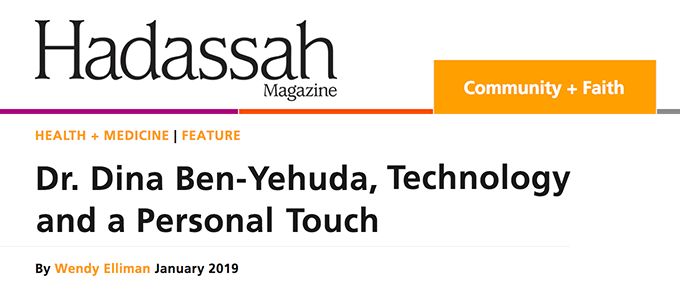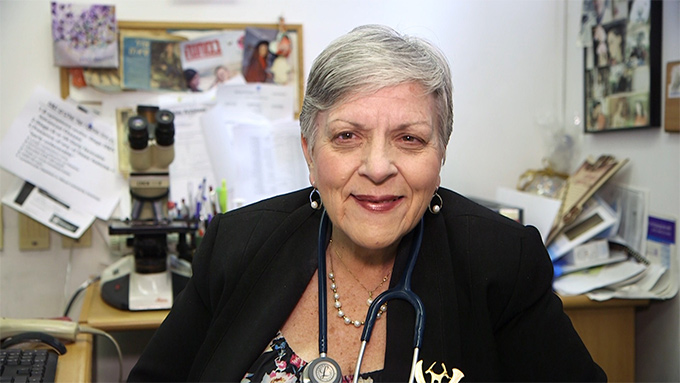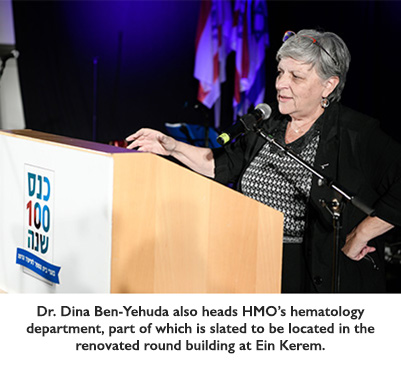

Dr. Dina Ben-Yehuda, 23rd dean of the Hadassah medical school.
When Dr. Dina Ben-Yehuda was approached to head the Hadassah-Hebrew University School of Medicine, she was at first reluctant to take on the position.
“I had no interest in giving up medicine for administration,” she said. But what persuaded the veteran Hadassah hematologist was “the opportunity of setting the way for the next generation”—and an understanding that she would not have to relinquish her clinical work or her cutting-edge research into malignant blood diseases.
Dr. Ben-Yehuda, who became the 23rd dean of the medical school in 2017, is the first woman to head the 70-year-old medical faculty and only the second female medical school dean in Israel. (Dr. Rivka Carmi has led Ben-Gurion University’s Health Sciences Faculty since 2000.)
The faculty she now heads—under the joint auspices of Hadassah and Hebrew University – includes not only the staff of the medical school, but also professionals at the schools of nursing, pharmacy, public health and community medicine and occupational therapy. Also under her purview are the biomedical research program, the Tzameret Military Medicine Program and the Institute for Medical Research Israel-Canada. Interconnectivity between Hadassah’s schools and programs, she noted, is an important focus for her.
At the same time, Dr. Ben-Yehuda, 65, is continuing to lead the Hadassah Medical Organization’s hematology division, a position she has held since 2004. In that capacity, she consults clinically nationwide and has brought her discovery of a protein that kills malignant blood cells close to Phase 1 clinical trials.
“Dina is the hardest-working person I know,” said longtime colleague Dr. Ora Paltiel, a hematologist and dean of the Hadassah-Hebrew University Braun School of Public Health. “And despite her superhuman schedule, she always finds time for the individual—patient, student or colleague.”
Seated in the small, modest dean’s office at the Hadassah medical school, Dr. Ben-Yehuda is calm and matter-of-fact when describing her new position. She is more focused on discussing the ever-expanding boundaries in medical science than the accolades she has accumulated and paths she has traveled in her career.
In her first year as dean, Dr. Ben-Yehuda has taken the school’s curriculum in diverse directions. Among the programs she introduced are several firsts in Israel, including one in computational medicine and bioinformatics—an emerging discipline that uses data and computer models to understand diseases. She is also behind the first required academic course in complementary and alternative medicine in a Western medical school and has initiated training in end-of-life care on the campuses of the schools of nursing, occupational therapy and public health.
“We’ve opened a joint course this year in medicine and computational science for 20 of the brightest students,” Dr. Ben-Yehuda said, noting that the program is one of only a handful of such courses worldwide that will graduate physicians able to create algorithms for precision medicine, a health care model that tailors treatment to each patient.
“What I bring to the office of dean,” Dr. Ben-Yehuda explained, is “what I learned on my first day of medical school: primum non nocere—first, do no harm. That puts patients and their well-being first. I remember thinking when I started as dean: I’m at the head of a fine medical faculty, and must do nothing that harms it.”
Do no harm does not, however, mean do nothing. “Technology is changing the face of medicine,” she said, referring to how computer science, information engineering and statistics are being used both to analyze biological information and to build the complex data systems necessary for new technologies, including machine learning and artificial intelligence. Computational science is part of the precision medicine of the future, which will enable identification of subpopulations of patients, their susceptibility to particular diseases and responses to treatments, Dr. Ben-Yehuda explained, noting that this will allow therapy to be customized and therefore increasingly effective.
Her enthusiasm about the promising advances that technology brings to medicine does not outshine her understanding of the vital need for the human touch in medicine. “At this time of big data and artificial intelligence,” Dr. Ben-Yehuda said, “students at our medical school are taught that the role of physician as healer is more necessary for patients than ever.”
Dr. Ben-Yehuda recalled a student asking her, “Why use the stethoscope when there’s now much faster and more convenient technology?” The student was referring to devices and apps that measure heart rate and blood pressure, though with less interaction with the patient. “I answered that through my stethoscope, I hear not only my patient’s heartbeat, but also his heart. Technology is important in diagnosis, but it’s no substitute for talking to your patients, looking into their eyes. Nothing replaces touching them to see where they feel pain.”
Dr. Ben-Yehuda models that compassion during her clinical hours, 6:30 to 8:30 every weekday morning. She also spends one day a week in the outpatient clinic of the hematology division.
One of Dr. Ben-Yehuda’s early-morning patients is Eliezer, who prefers not to disclose his full name. A fit 42-year-old father of five, he collapsed after a hike several years ago, only to discover he had a virulent form of leukemia. “Suddenly, I was facing a life-threatening illness whose best case scenario was months of really difficult treatment,” he said. “But I never felt I was fighting alone.”
He researched hematologists around the country before consulting Dr. Ben-Yehuda, so he was confident that he had the medical best. “What I hadn’t thought of—or thought would be important—was that I also needed a doctor who was warm and concerned,” said Eliezer. “Dr. Ben-Yehuda got to know my family and how they were coping with my illness, too.”
 Born in Haifa, Dr. Ben-Yehuda never wanted to be anything other than a doctor. At age 3, she lost her 7-year-old brother, Zvika, to cancer. “My mother was a Holocaust survivor,” said Dr. Ben-Yehuda. “Zvika’s death joined the Holocaust as something that we never talked about. I didn’t even know which cancer killed him, but I did know that I wanted to heal people.”
Born in Haifa, Dr. Ben-Yehuda never wanted to be anything other than a doctor. At age 3, she lost her 7-year-old brother, Zvika, to cancer. “My mother was a Holocaust survivor,” said Dr. Ben-Yehuda. “Zvika’s death joined the Holocaust as something that we never talked about. I didn’t even know which cancer killed him, but I did know that I wanted to heal people.”
Her interest in healing followed her into the army when, as a 20-year-old conscript in the Israel Defense Forces Armored Corps, she became the first female soldier honored with the Chief of Staff’s Citation. The award, presented to her in 1974 by Lt. Gen. Mordechai Gur, was for coordinating treatment of casualties in her unit during the Yom Kippur War. A regimental duty officer in the 14th Armored Brigade stationed at the Suez Canal, which lost over 300 soldiers, she assembled information about those killed or missing in action and informed their grieving families. This was prior to the IDF’s creation of a special unit to approach bereaved families.
In October 2018, Dr. Ben-Yehuda’s efforts during the Yom Kippur War were referenced when she pinned Israel’s highest military honor—the Medal of Valor—on her daughter. Capt. Or Ben-Yehuda had enlisted in the Caracal Battalion, one of the world’s handful of co-ed military units, and was stationed on Israel’s Sinai border. Called out one night in 2014 to investigate vehicles approaching the security fence from the Egyptian side, she and her driver ran into a volley of live fire. Both were immediately wounded. Despite her injuries, Ben-Yehuda held off 23 infiltrators while administering field aid to the wounded driver, calling for medical evacuation and directing the reinforcements.
Today, Ben-Yehuda, 28, married and a mother of three, still serves in the IDF. Her younger sister, Bavat Ben-Yehuda, 25, is a Jerusalem Music Academy graduate now training in speech therapy. Elder sister Dr. Shir Shabbat, 30, who is married and has a child, attended Hadassah’s medical school, graduating one year before her mother was appointed its dean. She just completed her internship at Hadassah.
“I learned from my mother that doing what you want in life is not simply words,” Dr. Shabbat said. “It is an essential truth.”
Dr. Ben-Yehuda, who received her medical degree from Ben-Gurion University of the Negev, first came to Hadassah in 1981 as an intern in the surgical department. Dr. Eliezer Rachmilewitz persuaded her to switch to his department, internal medicine and hematology. During that time, she met her husband, geriatrician Dr. Arie Ben-Yehuda, current chairman of internal medicine at Hadassah.
It was while interning at Hadassah that she learned the full story of her brother’s death. She dug through public medical records to discover that he had died of lymphoma.
“I was already in love with hematology,” she said. “Finding this out completed it. I had a sense of coming home.”
Following three years of post-graduate studies at Memorial Sloan-Kettering Cancer Center in New York City, she returned to Hadassah in 1992. In April 2000, she was appointed director of the hematology unit and, later, of the entire hematology division. Along the way, Dr. Ben-Yehuda has repeatedly been named outstanding teacher among the medical school faculty; in 2017, she received the Danielle Prize, awarded annually by the Israel-based Danielle Sonnenfeld Foundation to doctors and nurses “who rise beyond their professions and give of themselves to patients.”
Although Dr. Ben-Yehuda always wanted to be a physician, working in senior administration was never part of that dream. “It’s not that I lack ambition,” she said. “I was simply focused on doing everything I undertook as completely as I could—on achieving excellence, not on climbing the ladder. But one thing somehow led to another.”
“Dina is 100 percent an expert physician, embedded in a kind lady who is 100 percent soul,” said HMO’s director-general, Dr. Zeev Rotstein.
“I love being with patients, listening to them, searching for ways to help them,” said Dr. Ben-Yehuda. “It’s part of who I am. Everything in my professional life has been focused on their healing—as a physician, in teaching and in research.”
Wendy Elliman is a British-born science writer who has lived in Israel for more than four decades.